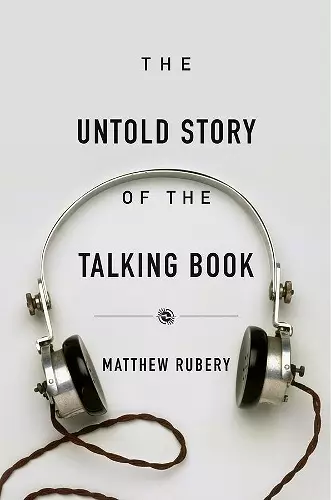The Untold Story of the Talking Book
Format:Hardback
Publisher:Harvard University Press
Published:24th Nov '16
Currently unavailable, and unfortunately no date known when it will be back

Histories of the book often move straight from the codex to the digital screen. Left out of that familiar account are nearly 150 years of audio recordings. Recounting the fascinating history of audio-recorded literature, Matthew Rubery traces the path of innovation from Edison’s recitation of “Mary Had a Little Lamb” for his tinfoil phonograph in 1877, to the first novel-length talking books made for blinded World War I veterans, to today’s billion-dollar audiobook industry.
The Untold Story of the Talking Book focuses on the social impact of audiobooks, not just the technological history, in telling a story of surprising and impassioned conflicts: from controversies over which books the Library of Congress selected to become talking books—yes to Kipling, no to Flaubert—to debates about what defines a reader. Delving into the vexed relationship between spoken and printed texts, Rubery argues that storytelling can be just as engaging with the ears as with the eyes, and that audiobooks deserve to be taken seriously. They are not mere derivatives of printed books but their own form of entertainment.
We have come a long way from the era of sound recorded on wax cylinders, when people imagined one day hearing entire novels on mini-phonographs tucked inside their hats. Rubery tells the untold story of this incredible evolution and, in doing so, breaks from convention by treating audiobooks as a distinctively modern art form that has profoundly influenced the way we read.
A detailed, lively, and well-peopled history of the technologies, economies, and organizations that have driven the recording of novels over the last 150 years…What class and ethnicity are narrators to have, and how present should they be as personalities? Is reading mostly for pleasure or education? Do blind people need books that mention disability—or are these to be studiously avoided? Should blind war veterans be provided with pornography to listen to? These are just some of the debates that surface in the archives Rubery has so elegantly plumbed. -- Christina Lupton * Los Angeles Review of Books *
As this entertaining exploration shows, the story of audiobooks is as full of surprising and serendipitous turns as any engrossing work of fiction—whether read on the page or heard through headphones. -- Isabel Berwick * Financial Times *
If audiobooks are relatively new to your world, you might wonder where they came from and where they’re going. And for general fans of the intersection of culture and technology, The Untold Story of the Talking Book is a fascinating read. -- Neil Steinberg * Chicago Sun-Times *
Rubery’s engaging and important monograph fills a significant gap in the debate. It asks us to consider what reading, in a literary context, really means, without falling back too readily on the physical activity. -- Dennis Duncan * Times Literary Supplement *
Rubery’s book is the more important, then, for rescuing an occluded story and one that is easily forgotten…The Untold Story of the Talking Book is lucidly researched and written. -- Paul Keegan * The Spectator *
Perhaps unsurprisingly, the world's biggest bookseller, Amazon, is now the largest producer of audiobooks, via its subsidiary Audible. Whether in future we will be read to by humans or robots appears immaterial. What is certain is that we will continue to derive pleasure from it, and Rubery—who sees audiobooks as a distinctively modern art form—makes a convincing case for why we should. -- René Wolf * Times Higher Education *
This peculiarly fascinating history takes us from the origins of the talking book, designed to entertain and help to rehabilitate blinded first World War veterans, through to the competitive big business of audiobooks today. -- Nora Mahoney * Irish Times *
[Rubery] explores 150 years of the audio format with an imminently accessible style, touching upon a wide range of interconnected topics…Through careful investigation of the co-development of formats within the publishing industry, Rubery shines a light on overlooked pioneers of audio…Rubery’s work succeeds in providing evidence to ‘move beyond the reductive debate’ on whether audiobooks really count as reading, and establishes the format’s rightful place in the literary family. -- Mary Burkey * Booklist (starred review) *
[A] fascinating cultural and sociological study of the emergence of talking books from wax cylinders to Audible. -- Jaipreet Virdi * Technology and Culture *
Matthew Rubery makes good on his title’s promise, telling a story that until now has been boxed up in the archives, and filling in a key chapter in the history of books and readerships. This book is more focused and more thorough than any other in the field—as well as more interesting—and is likely to stand as the definitive history of audiobooks for some time. -- James English, University of Pennsylvania
Matthew Rubery has scored a decisive contribution to the history of recorded literature in this magisterially researched and compelling book. There is something new on every page, with all the facts and factoids at once apt, eye-opening, and revisionary. -- Garrett Stewart, University of Iowa
- Nominated for George A. and Jean S. DeLong Book History Prize 2017
- Nominated for Ray and Pat Browne Award 2016
ISBN: 9780674545441
Dimensions: unknown
Weight: unknown
384 pages